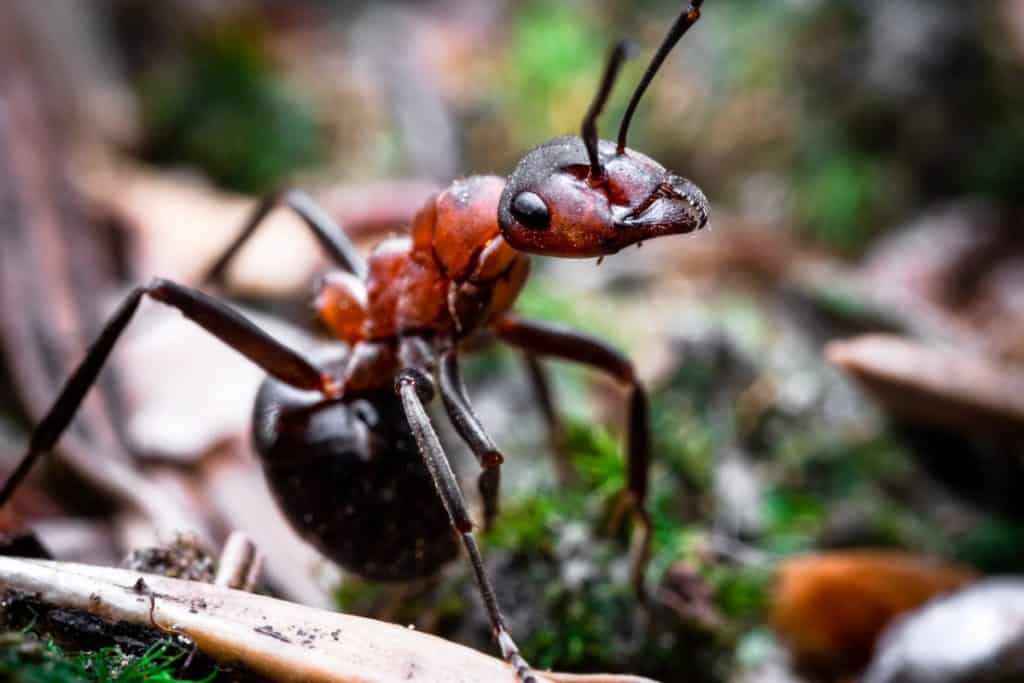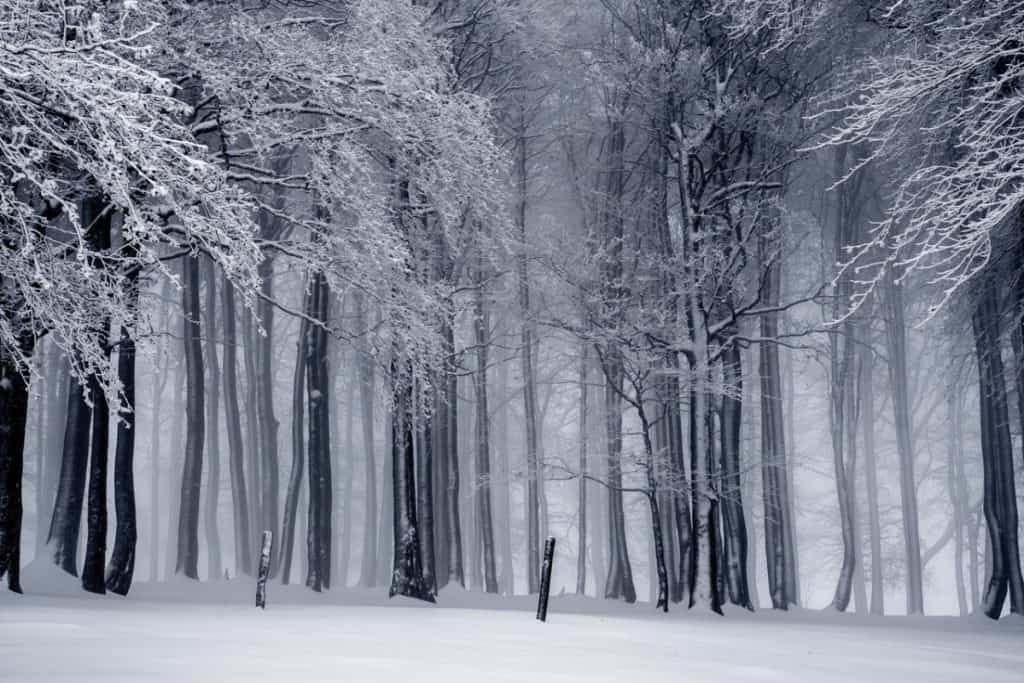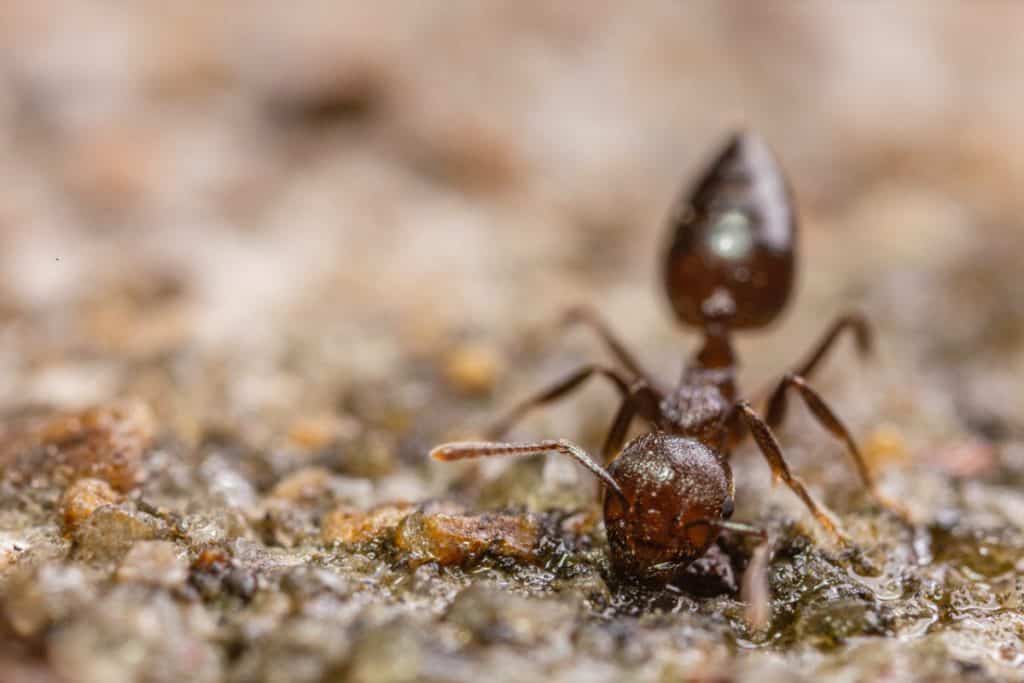
If you enjoy reading this article, why not check out our articles on Tiny Ants in the Bathroom? The EASY Way to Get Rid of Them and Why Do Dead Ants Attract More Ants? Everything You Need to Know
What To Do Ants In Winter?
If you’ve made your way here, chances are you want to know the answer to this question. So do ants hibernate?
It is a bit strange that we never see ants in the winter months right?
This is due to the fact that ants do indeed hibernate in the winter, and you’re about to find out both how and why.
So let’s dive in and find out why.
Do ants die in cold weather?

This is actually an interesting question to look at, because it really depends on the circumstances. Will an ant die if exposed to sub-zero temperatures for an extended period of time? If it’s on its own, yes, but a whole colony might not exactly die off.
Even if you had a mean streak, and placed an entire ant colony in your freezer, chances are the whole colony won’t die. Sure, some will, and while others may appear dead, this is just a state of hibernation. Not moving does not equal dead in the world of ants.
So when it comes to cold weather killing ants, it really depends on the context. An ant that’s alone will have a tough time making it through the cold, but in groups ants really are a remarkable insect. Ants will actually build nests deep underground, under rocks, or even in your home to escape the cold. These shelters, like the rock for example, will actually work as heat collectors for the species.
If ants are cold-blooded, how do they survive the winter?
The thing about ants, among other insects, is that they’re cold-blooded. All this means is that they utilize the environment to regulate the temperature within their bodies. So in the winter, it’s much harder to keep the heat in, which leads them to hibernate. They’ll stock up on fat, stop moving, and enter a state of hibernation to survive the winter. As their body temperature drops, they actually become quite sluggish in general.
So while you may not see any ants out and about once the temperature drops below 50 degrees Fahrenheit, that doesn’t mean that they’re dead. It just means they’re hibernating winter away.
How long do ants hibernate for?
The next you’ll need to know about ants, and their hibernation habits, is how long they actually hibernate for. This is due to the fact that winter lasts longer in some regions than others, so the answer can’t be the same across a place as diverse as the United States right? We have even more information on what ants do during the winter in our article Where Do Ants Live in Winter?
While ants hibernate throughout the cold months, there does seem to be a limitation on the amount of time they can do this for.
What month do ants hibernate?
In the winter months, as we’ve mentioned earlier, their cold-blooded nature will cause their bodies to become very sluggish. This will occur until the cold months are over, but the typical amount of time that ants hibernate for about 3 to 4 months on average.
Plus, in the autumn months leading up to winter, you’ll notice that there will be more ant activity around their nest. This is due to the fact that ants will actually be preparing their nest for hibernation. When it comes to hibernation limits, it really depends on how much fat the ants have stored away for the winter. Their bodies won’t be using much fuel, so that food they have stored away can really last them quite some time.
So while you may not see any ants in the winter, if you hangout by an ant hole on the first warm day of the year, you’ll start to see them poke their little heads out. Think of ants like tiny bears hibernating in a cave. They store fat, slow down, and sleep the winter away.
What do ants do during the winter months?
In the winter months, ants will mostly hibernate. As we’ve mentioned earlier, there is really not much else for ants to do in the winter. This is why nest prep is so important for ants, because without it, they could end up passing away in the winter. So while ants will most likely be hibernating in the winter months, their nests will be very active in the months leading up to the winter.
So what gets done in the nest during the winter?
During the winter, nothing really goes on in the nest. The ants will bunch up around the queen, and sleep the winter away together. It’s actually quite interesting because the queen is even inactive during the winter months. If you’re interested in ant queens, we discuss them in lots of other articles, such as this one: Are Ant Farms a Bad Idea?
This means that food runs low, no new members are born, and the nest remains quite peaceful. This is why there is so much work for the nest to do once they emerge from their hibernation.
When you think about an ant nest during the winter, there really isn’t much to think about. The nest might even appear dead at times, but trust us, they’re probably just in hibernation.
Do different species of ants do different things in the winter?

While ant species have many different traits, mindsets, and jobs, that doesn’t mean that they’re all that different when winter comes around. This is due to the fact that ants are cold-blooded as a species, which means that no matter what species of ant you’re looking at, it will definitely hibernate in the winter.
They have to do some things differently right?
Some ants may act differently than others, but this does depend on the species to an extent. In species that have one solo queen, they will gather around her and the eggs to keep them warm for the winter. This is different in species that have worker ants which are also fertile because there will be less emphasis on the queen.
Ants will essentially act the same in the winter months. Nest survival is a priority, which means ants will focus on keeping their fertile members warm.
Where do ants go in the winter?
As we’ve mentioned earlier, ants will make nests out of very different objects. This is due to the fact that each nest is set up in a strategic way to gain heat from the sun, and this is extremely important during the winter months. So let’s take a look at what types of nests ants hibernate in during the winter. Some of these might surprise you.
Under large rocks
One of the most common places you’ll find an ant nest is under a large rock. This is due to the fact that large rocks provide plenty of safety from predators in the summer months, and during the winter months, it provides an ample source of heat.
While the surface of rock might not seem hot to the touch in the winter, that doesn’t mean that it’s not holding heat. The that the rock generates is actually the sole source of life for ants with nests under rocks during the winter months.
Under tree bark
Not all ants do this, but if ants can make a home out of a tree they definitely will. Just like squirrels who hibernate in the winter, ants will quite literally do the same exact thing. Instead of being inside a carved out portion of the tree, ants will hide right underneath the bark.
This is due to the fact that the ants will use the warmth that the tree generates as a heat source to keep them warm for the winter. Plus, as you may know, a tree is the host of an array of other nutrients ants can benefit from during the winter.
Underground
When you see an anthill or an ant hole, that’s quite literally only the surface of the nest. While you may think that kicking dirt on it may snuff them out, this is hardly the case. These nests are intricate and run very deep underground. In the winter, ants that live in these nests, actually hibernate in them as well.
They’ll gather as much food as they can, and once that time comes, they’ll actually cover up the entrance hole on their own. This keeps the cold out, predators out, and makes it seem like they don’t even exist. So while you may think there are no ants around in the winter, you could have stepped over a nest today.
In your home
If ants do end up creating a nest within your home, you’re going to run into some problems. This is due to the fact that ants that create a nest in your home will actually remain active during the winter months. Therefore, instead of hibernating, the ants won’t need too due to the level of warmth your home provides.
Ants live in all different types of places, and while they may be different, they all tend to function in the same way. They’re designed to be safe, secure, and to keep the cold out.
Final Findings
Ants are much more interesting than they appear to be, and that’s due to their methods for survival. While it might seem like ants die off, as you now know, they’re really only sleeping.
Ants are not exactly the smartest insect, but the way in which they do things is truly fascinating.
Now, ants don’t automatically hibernate when it’s cold, and this is why you’ll find active ants in your home. Therefore, if you find a bunch of ants in your home during the winter, chances are there is a whole nest somewhere inside.
Interesting stuff right?
If you enjoyed reading this article, why not check out our articles on Are Ants Active at Night? and What Can Ants Damage? What You Didn’t Know
Recent Posts
Tiny Black Bugs in Bathroom NO WINGS: What They Are and What to Do!
Finding tiny black bugs in your bathroom can be uncomfortable, to say the least. Especially if they are persistent, or they appear in very large numbers, which they often like to do. When it...
Tiny Black Bugs in Plant Soil - What Are They & What To Do About It
A short horror story: You get a new houseplant. You do your best to take care of it. You’ve ensured that it has the right soil, the right amount of sun, it gets enough water. And then one day, you...

